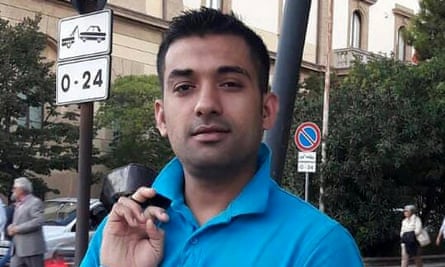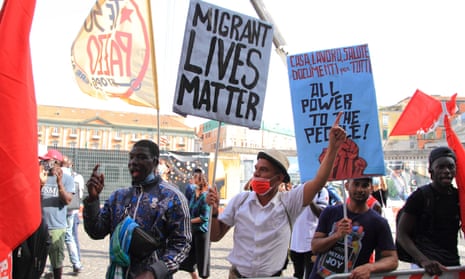Earlier this summer, as millions of Italians were locked down inside their homes, fruit and vegetables were left to rot in the fields despite the cost to the country’s economy.
Italy’s informal refugee and migrant workforce, who had previously worked long hours in wretched conditions for paltry wages to bring produce off the fields, were absent from the farms.
“Most of the migrants work without proper papers,’’ says Tonino Russo, regional secretary in Sicily of the Flai CGIL, Italy’s largest union. ‘‘Because of the lockdown they stopped going to work for fear of the virus and being questioned by the police. Without these people, agriculture in Italy is on its knees.”
The Covid-19 pandemic has exposed the extent to which Italy is reliant on its migrant workforce, many of whom work with no formal contracts or official paperwork. Up to 500,000 of Italy’s 680,000 migrants and refugees are estimated to work as farm labourers. Around 40% have no proper contracts and little legal protection. Migrant labour is cheap for farmers looking to turn a profit: some African workers say they are being paid just €2 (£1.72) an hour – €7.50 below the legal minimum – with no contract or health insurance.

In May, a panicked Italian government, fearing a catastrophic collapse of its agricultural sector, allowed undocumented migrants to apply for a six-month work permit allowing them to legally stay in the country.
Take-up of the new scheme has been less than enthusiastic. The government hoped to regularise at least 300,000 workers, yet according to data from the interior ministry released by Amnesty International only about 80,000 migrants have so far applied, and 88% of applications are not related to agriculture.
The main reason appears to be the terms under which undocumented migrants can apply. Only those whose right to work expired after 31 October are eligible, yet most of those who bring in the harvest every year, many of whom risked their lives to reach Europe, have been living and working illegally in Italy for years.
Hassan, a 30-year-old man from Beni Mellal, in Morocco, is one of several hundred foreign seasonal workers who come to the Sicilian village of Cassibile to gather in the annual harvest. The makeshift settlement he usually calls home has recently had an upgrade and the municipal government has supplied chemical toilets, rubbish bins and medical care to prevent the spread of Covid-19.

“I’ve spent almost 18 years in Europe – and 15 years in Italy – but in the past 10 years I couldn’t renew my documents,” he said.
Hassan had hoped that the new economic crisis would give him a chance to obtain his papers. But under the new scheme he doesn’t qualify.
Life for Hassan will continue much like before. In order to survive, he will continue to live in slums, near the fields, as an “invisible worker”.
Workers also say that the visa scheme does nothing to address the exploitation, violence and mistreatment they endure in Italy. ‘‘Exploited migrants are treated as dead meat. They are considered objects, the property of businessmen, slaves,” Salvatore Vella, a prosecutor in Sicily, told the Guardian.

A wave of violence and migrant killings has highlighted the plight of the men and women who have become so crucial to the Italian economy. On 3 June, Adnan Siddique, a 32-year-old Pakistani fieldworker who had lived in Italy for five years, was stabbed to death at his home in Caltanissetta in central Sicily. According to police, he was killed for defending migrant workers from alleged gangmasters, who demanded half their daily earnings.
On 12 June, fire ripped through a shanty town on the outskirts of Foggia, in Puglia, where African migrants are illegally employed in the fields. Mohamed Ben Ali, a 37-year-old Senegalese farmworker, died when his shack burned down. He was the fourth person to die in 18 months from fires that have become a regular occurrence in informal settlements where a lack of electricity means people rely on open fires to cook and keep warm.
“The deaths of Ben Ali and Adnan are yet another tragic result of the working conditions of thousands of migrants in southern Italy,” says Yvan Sagnet, an anti-slavery activist from Cameroon, who once worked in the fields of Puglia picking tomatoes.
“These deaths are the result of a violent and exploitative world, in which migrants have been forced to live and work for years. And many others will die if we don’t act soon.”
Sagnet says that Italy must urgently grant legal status to all migrant workers to help save the economy and ensure that exploitation and violence stops. “The coronavirus emergency has taught us that we need migrants,” he says. “We have a chance to show that Adnan, Ben Ali and others did not die in vain.”
